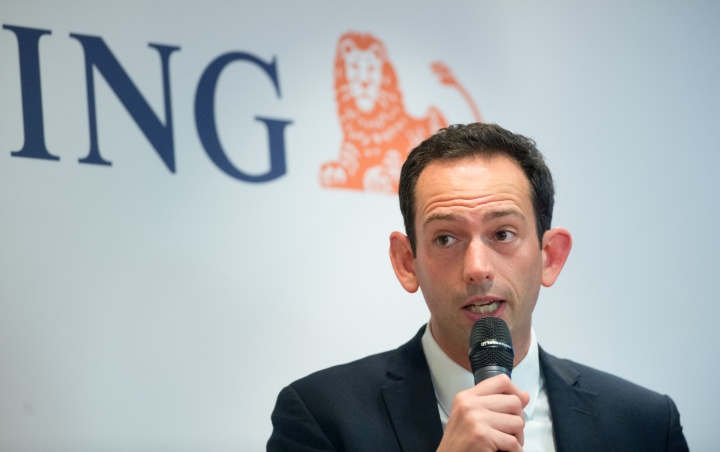Senior economist from ING dissects four pro-Brexit arguments
Last modified: 20 juli 2023 12:30

This thursday Britons will vote on Brexit. James Knightley, senior economist ING at the UK office and on an intense Brexit tour for ING’s corporate clients across the globe, dissects four often heard arguments from pro-Brexit campaigners.
Door Karima O’Flynn
On 11 May, the fourth edition of M&A forum The City took place against the backdrop of the June 23 referendum on Brexit. Robert Specken, Managing Director ING Commercial Banking, Corporate Finance, opened the M&A Forum. One of the speakers was James Knightley, senior economist at ING, who had some interesting numbers in his presentation. He also debunked four often heard arguments from the Leave-campaigners.
Lees ook
Current position
The current predictions regarding UK voters are: 40% are likely to vote remain, 40% want to leave and 20% are undecided. This means that it really could go either way, warned Knightley.
The bookies have currently placed the odds of staying at 5/2, and the odds of leaving at 3/1 “on”. They see a bigger chance in Britain staying. Why? Because the chances are that the people who are still undecided on the day of the vote will probably either not vote, or vote to maintain the status quo (Britain in Europe). In short, the doubters are less likely to vote for a new situation.
Younger people are more likely to be in favor of the EU, because that is all they have known. The older generations are perhaps looking back with rose tinted glasses to a pre-EU past and more inclined to opt out.

Knightley while giving his energizing presentation
Voting varies across the regions. Scotland is pro-EU. This means that, in the case of a Brexit, Scotland might demand another referendum on Scottish independence and vote to leave, a double divorce for the Brits. The Midlands and Yorkshire, traditionally more reliant on manufacturing, are more inclined to vote Leave. London as a hub for financial services is very much in favor of staying, according to the polls.
Voters with a higher level of education are more likely to be in favor of Britain staying in the EU. This is an important observation as highly educated voters are more likely to have been part of the succeses of the EU, in employment or study opportunities. Less educated voters are likely to have more keenly felt the competition for work from, for example, Eastern Europe workers.
The arguments in the Leave campaign, what’s true?
- Argument 1: “Uncontrolled immigration from EU is putting pressure on resources and hurting the employment prospects of Brits.”
Of the 7.5 million citizens that immigrated into Britain only a third are from the EU. More people move to Britain from China and Commonwealth countries than from the EU. Further, since 2012, the number of highly skilled EU citizens that move to the UK from countries like Spain, the Netherlands, France and Germany exceeds the number of unskilled workers from Eastern Europe. This is a result of the growth of the UK economy against a lack of growth and opportunity in the rest of the EU. When the economies of other European countries pick up, the immigration into the UK is likely to even out.
- Argument 2: “The EU causes a loss of sovereignty. Its policies stifle growth.”
The UK is one of the least financially regulated countries in the world. Plus, if the UK opts out, it will still have to adhere to the terms of the single market in trade.
- Argument 3: “Britain spends billions of pounds each year on EU projects. This is money that could be better spent within the UK.”
Knightley argues that at a net contribution to the EU of £8.5bn versus a total UK government spending of £750bn it is relatively small, given it does allow access to the single market.
- Argument 4: “The UK will secure good deals when they leave the EU.”
After a Brexit, the UK has two years to negotiate deals with the EU. At the same time, the EU is entering a period of upheaval. In the coming two years there are elections in France, Spain and Italy. With the rise of populist parties and politicians in these countries, such as Marine Le Pen, Beppe Grillo and Geert Wilders in The Netherlands, the EU would be hesitant to give the UK a quick and favorable deal. The risk would be that this would be seen as an encouragement for populist parties to push for referenda and deals similar to Britain.
What are the potential effects of Brexit on trade and investment?
Foreign investment accounts for around 30% of total investment spending in the UK. If the UK leaves and the two year negotiations kick in, why would you invest in uncertainty? Investment is likely to be hurt, and with that an impact on jobs is certain. Imposition of trade barriers – should the UK fail to negotiate a full deal within the 2 year window offered under Article 50 of the Lisbon Treaty – will likely be harmful. Further, a drop of the Pound Sterling of as much as 20% is predicted given the UK has a very wide current account, which is going to look even more troubling if portfolio and direct investment flows into the UK slow, according to Knightley.









